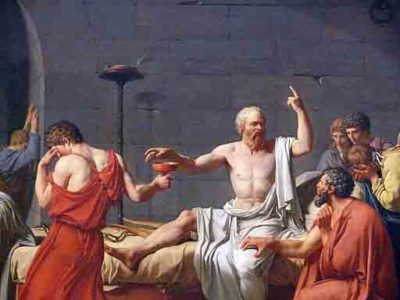Contents
- Introduction
- Burning Books 213 B.C.
- Persecuting Philosophers
- Banned Books & Bible
- Books lost forever
- Inquisition Censorship
- Index Librorum Prohibitorium
- Copernicus & Galileo
- Darkness in Enlightenment
- Revolution & Banned Books
- Colonialism & Book Bans
- New Nation Censorship
- Nazi Germany Book Burning
- USSR Banned Books
- McCarthyism Book Banning
- 21st Century Book Bans
- Banned Books Battles
- Digital Age Book Banning
- World Wide Book Banning
- Book Banning is Bad
- The Future of Book Banning
- Looking Back in History
- Discover New Worlds
History of Banned Books
Persecuting Philosophers and Banning Books in Ancient Greece
Ancient Greece gave birth to democracy, philosophy, and the dramatic arts. However, Greek society had a dark side. This was especially true for those whose ideas didn’t align with the established belief system at that time. Despite enjoying intellectual freedom, the society paradoxically persecuted philosophers. It also prohibited “heretical” books.
There was a diversity of opinions and spirited debates in ancient Greece. However, the leaders did not embrace every novel idea.
Some Ancient Greeks viewed revolutionary thoughts and their proponents as threats to the existing order. Consequently, this era witnessed early instances of banning books and intellectual persecution.
Anaxagoras, a philosopher predating Socrates, put forth the revolutionary notion that the sun and moon were physical entities rather than gods. While today we consider this fact as obvious, the Ancient Greek leaders regarded this thinking as dangerous and revolutionary in the 5th century BC.
Anaxagoras faced charges of impiety, a crime in Ancient Greece, leading to his exile from Athens and the burning of his books.

The most renowned case of philosopher persecution in Ancient Greece centered around Socrates He was the inventor of the Socratic method. He was famous for his probing questions and challenging traditional beliefs. Despite democratic Athens protecting freedom of speech, some leaders found his “radical” ideas too unsettling. Consequently, in 399 BC, they tried, convicted, and sentenced Socrates to death by poisoning with hemlock. This was for the alleged corruption of the youth and disrespect towards the gods.
Protagoras, another prominent thinker in Ancient Greece and a sophist, asserted that “man is the measure of all things.” This implies that truth is subjective and varies from person to person. Additionally, he questioned the existence of the gods, which was deemed inappropriate in a highly religious society. Consequently, the powers that be declared his works heretical and burned them, and banished him from Athens.
Banning books certainly has a long history. Although the Ancient Greeks persecuted these philosophers and banned their books, their ideas and contributions live on. They continue to shape the course of history and influence the world still today.